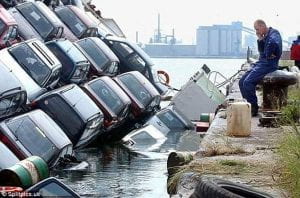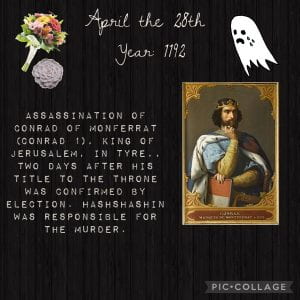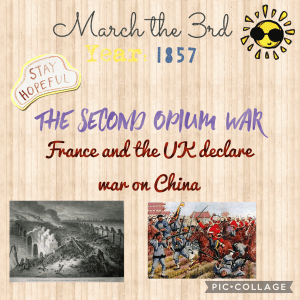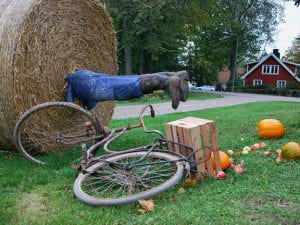History of the Day March 3rd
The Year 4 Weekly
4H are excited to share our podcast, The Year 4 Weekly. See below for our TWO introductory episodes!
Linking the 100WC to our poetry
This weeks 100 word challenge, (see below)
Is a picture of an unfortunate person, that ended up in a haystack.
This reminded us of a poem we read, called Mulga Bill’s Bicycle.
A man called Mulga Bill gets a new bike but doesn’t know how to ride it.
He takes it out to ride for the first time, and crashes it into a lake.
Here are the links to some of our writing.
Complex Sentences
We have been looking at complex sentences in class. A complex sentence is a sentence that has a dependent clause as well as the main clause. The main clause on its own is called a simple sentence.
We were given the following simple sentences based on the image below and the have turned them into complex sentences (Some examples are listed, with the dependent clause in italics.)
| The men sat at the table. | After walking to the bottom of the garden, the men sat at the table. |
| The men wore red coats. | The men wore red coats because they had to. |
| The men were feeling tired. | During the Captain’s boring speech, the men were feeling tired. |
| The table was piled high with food. | The table, which was down by the water that day, was piled high with food. |
| The weather was very hot today. | After several days of rain, the weather was very hot today. |
100 Word Challenge
One of the things that we are beginning to do as we focus on our writing this term is the 100 Word Challenge. This is a weekly writing challenge that we complete and post on our class blogs. There is a prompt each week, which is sometimes a phrase, or some words, or even a picture. We are able to compare our writing to other kids around the world, who have also done some writing using the same prompt.
The first prompt is the image below. Have a look at our individual blogs to see what we have come up with!

Indigenous perspectives
Today we did a lesson on biomes for our UOI (Unit Of Inquiry.) Mr. Huebl told us to go to a website called UCMP Berkeley, which gave information about the five main types of biome, Aquatic, Grassland, Desert, Forests and Tundra. The website was what we used for our research on biomes. The link to this website is here: http://www.ucmp.berkeley.edu/glossary/gloss5/biome/.
For our second part of the task was to find and identify the tribe of Indigenous people that have once lived there, or are currently living there. We did this part of the lesson because we have to link our learning to different perspectives, including those of indigenous people. Also, because we are celebrating reconciliation day (May 28th, Monday) for 2018.
We ill post our work to our blogs soon, and you can read them by clicking the links on the side of the page.
Written by Ivan
Who We Are
Our first Unit of inquiry for the year was ‘Who We Are’. The Central Idea was “As we grow we look at the world differently.” Content-wise, we integrated the Health Curriculum as well as Cyber-Safety principles. One of the culminating experiences for this unit was the children creating a Code of Conduct for their blogs, as well as an ‘About Me’ page that follows this code. These can be seen as menu items at the top of the student blogs (listed at the side of this page.)
Any comments about their Codes of Conduct or About Me pages will be well-received and appreciated!
Exhibition Progress 17 October
Reflection 13 September
Time Zone Research
In Mathswe are looking at Time. One of the things we needed to inquire into was Time Zones. Sometimes in Australia we have five time zones and at other times we have three. This was something we wanted to find out more about!
Students were given some suggested lines of inquiry but also encouraged to come up with their own. We needed to acknowledge our sources of information as well as show the answers to the specific lines of inquiry we chose.
Some suggestions were
- What purpose to time zones serve?
- How are the boundaries of time zones determined?
- What is daylight saving for?
- Who decides how long a second is?
Look at the student blogs to see what everyone came up with!
Forensic Science
Today saw Year 5 experiencing “A case of Discovery” by Education Interactive. This was a fun interactive way for the students to engage in the science of forensics.
Students were presented with a series of clues, and through engaging with manipulative materials, were able to crack the code and solve the case.
Lego Maths
It’s a lazy Spring afternoon, with the students not in the optimum frame of mind for a Mathematics lesson. We decided to play with our new lego set and see how we could use it to show Mathematical understanding.
These are some of the things the students came up with:
6Hu Mylor Camp
What we did for year 6 camp
First day of year 6 camp, we were put in three different groups
Each group went to an activity.
Those activities were canoeing, the challenge course & initiative pursuits.
Those activities fairly challenging for some people.
On that night the group one tenters were setting up for camp.
On day two we sorted into five groups.
On that day we did most of the activities which were Giant Swing, Flying Fox, bridge building and Archery. Most of the year sixes liked bridge building.
On this night group one packed the tents up and let the group two tenters to set up.
On the last day we were kept in our five groups and we did the last few activities which are Archery and Low ropes.
When we have have finished all the task we got all our bags in the bus and were ready to go.
What is my Culture?
Year 6,
Our Individuals and Societies unit this term is “When Cultures Collide”. An important thing for you to understand before looking at different cultures around the world is what the world culture means, and what students believe their own culture means.
To do this, please have a quick look at the following sites, that discuss different definitions of what a culture is:
- Culture is the characteristics of a particular group of people, defined by everything from language, religion, cuisine, social habits, music and arts.
- Culture is taught and learned and shared – there is no culture of one.
- culture is defined as the shared patterns of behaviours and interactions, cognitive constructs, and affective understanding that are learned through a process of socialisation. (a list of definitions that are a bit complicated)
- Culture is our way of life. It includes our values, beliefs, customs, languages and traditions.
You should have a fair idea of what things the term ‘culture’ includes. Using hyperlinks as references, create a blog post on your personal blog that outlines your personal definition of culture. The post can include images, but the writing should not be more than a few sentences.



